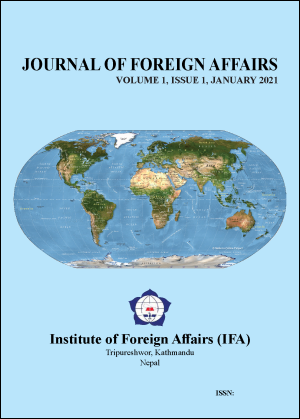Nepal’s Post Pandemic Diplomacy
DOI:
https://doi.org/10.3126/jofa.v1i1.36255Keywords:
COVID-`19 Pandemic, Non-traditional threats, Nepal, Foreign Policy, Small State, Policy CapacityAbstract
The COVID-19 pandemic has underscored the importance of priortising health and other social and environmental issues and treating them as national security concerns. Taking a small state policy capacity approach-a small state’s ability to make informed policy decisions, this article looks at the nascent efforts being made to pursue regional cooperation in dealing with non-conventional threats in South Asia; and both implications and opportunities for Nepal to diversify its diplomatic engagement with a view to bridging its own domestic capacity gap-heightened by the pandemic. This analytical article argues that this is the right time for Nepal to reframe the issue of health and other emergencies, recalibrate the roles of its domestic institutions and diversify its diplomacy with the regional players and pivotal middle powers for building domestic capacity.
Downloads
Downloads
Published
How to Cite
Issue
Section
License
© Institute of Foreign Affairs

